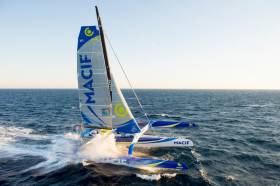Displaying items by tag: 3Di
Record-Smashing 2017 Offshore For North Sails
#NorthSails - North Sails Ireland is looking back on a record-breaking year in 2017 for the global sailmaker's offshore clients, all of whom were using its 3Di performance sails.
Last January, Armel Le Cleác’h sailed Banque Populaire VIII around the world solo in the Vendée Globe in 74 days, 3 hours, 35 minutes and 46 seconds, breaking the solo (monohull) round-the-world record.
That same month, Francis Joyon with his IDEC Sport crew took the Jules Verne Trophy for the fastest global circumnavigation ever: an incredible 40 days, 23 hours and 30 seconds.
During the summer, records were falling so fast that North Sails had a hard time keeping up: Team Concise in the Round the Island; Mighty Merloe and Comanche in the Transpac; Joyon’s IDEC and Thomas Coville’s Sobeto Ultim in the Transatlantic Outright; Prospector in the Marblehead to Halifax.
Come November, Coville did it again, in tandem with Jean-luc Nelias on Sodebo in the Transat Jacques Vabre. Indeed, taking in his solo circumnavigation record in December 2016, he must hold a personal record for the most sailing records broken in a single 12-month period.
What’s more, North Sails estimates that Coville’s 3Di Endurance mainsail had 75,000 miles (the equivalent of three times around the world) logged when he broke that singlehanded east-about circumnavigation time.
More recently, in December, Christmas came early for Francois Gabart when he and his MACIF took the outright solo around-the-world record by lapping the planet in 42 days, 16 hours, 40 minutes and 35 seconds. (The team also set a new 24-hour distance mark to beat in November.)
The final record of 2017 went to LDV Comanche, who set the pace for future Rolex Sydney Hobart Races with a time of 1 day, 9 hours, 15 minutes and 24 seconds.
With that results in the books, North Sails Ireland in Myrtleville raises a toast to its offshore clients who continue to push its products to the limit.





























































